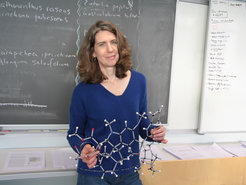Sarah O'Connor receives the Gottfried Wilhelm Leibniz Prize
The Jena chemist is awarded the most prestigious German research prize for her fundamental discoveries on plant natural product biosynthesis.
On December 8, 2022, the German Research Foundation announced the ten Leibniz Prize winners for 2023. Among them is Sarah O'Connor, director at the Max Planck Institute for Chemical Ecology in Jena. The natural products chemist studies metabolites in plants, particularly alkaloids and iridoids, which are often of interest as medicinal agents. Her research focuses on how plants produce these complex compounds from simple building blocks and how metabolic pathways have developed over the course of evolution. Her findings are of great importance for the possible synthetic production of medicinal substances.

"Plants are the best chemists!" This is how Sarah O'Connor explains her fascination for her research topic. The natural products chemist studies the molecular basis of plant secondary metabolism. Plants produce an enormous number of complex molecules that have important ecological functions apart from the central metabolism. Many of these substances exhibit valuable medicinal effects and are therefore used in both traditional and modern medicine. How plants produce this vast variety of metabolites is a question Sarah O'Connor wants to get to the bottom of.
Now Sarah O'Connor will be awarded the Gottfried Wilhelm Leibniz Prize 2022. This was announced by the German Research Foundation on Thursday, December 8, 2022. Sarah O'Connor is director at the Max Planck Institute for Chemical Ecology and honorary professor at Friedrich Schiller University Jena. "I am deeply honored to have been selected to receive this important award. I consider myself very lucky to be part of the vibrant scientific community in Germany," she said overjoyed, after learning of the award.
In the Department of Natural Product Biosynthesis at the Max Planck Institute for Chemical Ecology, which she has headed as director since 2019, Sarah O'Connor and her colleagues investigate the secondary metabolism of selected plants. She was instrumental in unraveling the biosynthetic pathways for the anticancer agents vincristine and vinblastine in the Madagascar Periwinkle Catharanthus roseus and for the toxin strychnine in the strychnine tree Strychnos nux-vomica.
Basic research into the biosynthesis of important natural products also has applications in synthetic biology, which is becoming increasingly important. Sarah O'Connor's group is also developing new biological platforms to produce high-quality plant-derived natural products cheaply and rapidly.
Sarah O'Connor received her PhD in organic chemistry from the Massachusetts Institute of Technology (MIT) in Cambridge, USA, in 2001 with a thesis on protein glycosylation. After professorships at MIT and the University of East Anglia, UK, she was group leader at the John Innes Centre in Norwich, UK, from 2011 to 2019. In 2019, she became director at the Max Planck Institute for Chemical Ecology in Jena, Germany. She also became an honorary professor at the University of Jena in 2022. O'Connor has been a member of the European Molecular Biology Organization since 2017, and in 2018 she was awarded an ERC Advanced Grant. Her awards include the Perkin Prize for Organic Chemistry from the Royal Society of Chemistry and the 2022 Ernest Guenther Award in the Chemistry of Natural Products from the American Chemical Society.
The Gottfried Wilhelm Leibniz Prize is considered the most prestigious German research prize. It is awarded annually by the German Research Foundation (DFG) and endowed with 2.5 million euros. The award ceremony will take place in Berlin on March 15, 2023.












